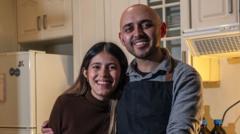Fabriccio Díaz and Lucía Ramírez are on a mission to sustain the art of film photography as they run Arca Film Lab, a burgeoning hub for old-school photo enthusiasts in Central America.
Young Couple Revives Nostalgia through Central America's Only Photo Lab

Young Couple Revives Nostalgia through Central America's Only Photo Lab
A passion project blossoms into a fully operational photo film lab in Guatemala City, bringing analogue photography revival.
It all began as a cherished hobby for 28-year-old Fabriccio Díaz and his 25-year-old wife, Lucía Ramírez, who have transformed their apartment in Guatemala City into the first fully-functional film development lab in Central America. "We started this as a passion project," Fabriccio recalls, noting the demand has surged to over 60 clients per month with 800 film rolls developed this year alone. The couple established Arca Film Lab in September 2023 after realizing a significant gap in quality film development services in the region, which pushed them to dive into learning the craft.
"Our little venture took off when friends asked us to develop their films," Lucía remembers. Initially, Arca Film Lab operated solely through an Instagram page, but their innovative spirit saw them rapidly grow as they embraced every form of analogue photography, including the intricate E-6 processing for positives.
Self-taught through extensive YouTube tutorials and guidance from international film laboratories, the couple expressed gratitude for the supportive community that responded to their queries. Their workload isn’t just limited to film development; they also organize social “photo walks” in historic Antigua, allowing fellow enthusiasts to explore the art of analogue photography together.
Recent enthusiasts like 22-year-old Iván Ortiz connect with the nostalgic feelings that older cameras evoke. "It’s like nostalgia for a generation we've never lived in," he declares, highlighting the tangible aspect of physical photos that digital images lack. Steven López, a traveler documenting Mayan culture, echoes this sentiment, explaining that the process of developing film can be as thrilling as Christmas morning.
However, challenges remain in preserving this growing community. Ronald Ottoniel, 26, shares difficulties in sourcing analogue cameras in good condition. Fabriccio and Lucía also face bureaucratic hurdles in importing the necessary chemicals for development, a situation that prevents many labs from offering advanced services like E-6 processing. Despite their expansion, the couple is committed to maintaining the personal touch that initially fueled their endeavor; they often engage with clients through thoughtful gestures, such as handwritten notes.
Operating out of their humble apartment, their film development process is hands-on. Precise control over temperature and exposure time is crucial for success, a dramatic shift from the automated processes seen in commercial labs. "After developing over 800 rolls, this is second nature," remarks Fabriccio.
Their four-month-old cat, Toto, also plays a crucial role in their day-to-day operations, adding a sense of warmth and companionship to the challenges they face. Following development, films are carefully dried in the bathroom—a clever solution to keep them dust-free—prior to scanning them with the highest-resolution film scanner in the region.
Expanding their services into El Salvador has opened up new avenues for the couple, who hope to collaborate with established film brands like CineStill and Eastman Kodak in the future. Their aspirations include branching into cine film roll development, broadening their scope into the world of cinematography. “We are determined to ignite a movement in Central America’s cinematography scene,” Fabriccio concludes with palpable enthusiasm.









